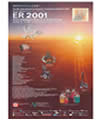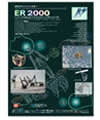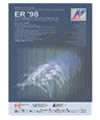|
Evolutionary Robotics Symposium
Applied AI Systems organizes Evolutionary Robotics Symposium which was held eight times since 1993.
These symposia aimed at both industry and academia, researchers of top international stature
from around the world presents results from their latest studies in the fields of intelligent robotics,
evolutionary robotics, and ALife. The goal of the symposia is to further research and development in
the fusion of findings in biological, neurophysiological, and evolutionary studies with intelligent robot
technology.

|
ER2001
Dr. Inman Harvey, Evolutionary Robotics Group, COGS, University of Sussex, U.K.,
"Artificial Evolution: A Continuing SAGA"
Prof. Robert Full, Poly-PEDAL Lab., University of California at Berkeley, U.S.A.,
"Using Biological Inspiration to Build Artificial Life that Locomotes"
Dr. Hiroaki Kitano, ERATO Kitano Symbiotic Systems Project, JST, and Sony Computer
Science Laboratory Inc., Japan,
"Integrated Perception and Behaviors in Humanoid"
Prof. Jordan Pollack, Volen National Center for Complex Systems, Brandeis University, U.S.A.,
"Coevolutionary Robots"
Dr. Owen Holland, Dept of Computer Science, University of Essex, England and California
Institute of Technology, U.S.A.,
"From the Imitation of Life to Machine Consciousness"
Dr. Dario Floreano, Evolutionary & Adaptive Systems, Institute of Robotics, Swiss Federal
Institute of Technology Lausanne,
"Evolution of Spiking Neural Controllers for Autonomous Vision-based Robots"
Prof. Rodney Brooks, Director of AI Lab, MIT, U.S.A.,
"Steps Towards Living Machines"
Dr. Francesco Mondada, Evolutionary & Adaptive Systems, Institute of Robotics, Swiss
Federal Institute of Technology Lausanne,
"Interactions between Art and Mobile Robotic System Engineering"
|

|
ER2000
Prof. Chris Melhuish, Intelligent Autonomous Systems Engineering Laboratory, University of the
West of England, "Control and Coordination Mechanisms for Micro-Robots - Getting the Most from the
Least"
Prof. Kazuyuki Murase, Dept of Human and Artificial Intelligent Systems, Fukui University, Japan,
"Deterministic Chaos in Autonomous Robots"
Dr. Adrian Thompson, Center for Computational Neuroscience & Robotics, COGS,
University of Sussex, U.K., "Evolution of Electronics without Design Rules"
Prof. M.V. Srinivasan, Center for Visual Science, Australian National University, Australia,
"From Living Insects to Autonomous Robots"
Stelarc, Notthingham Trent University, "Robots in Art"
Prof. Lotfi Zadeh, Berkeley Initiative in Soft Computing, University of California, U.S.A.,
"The Future of Soft Computing"
Prof. Inman Harvey, Evolutionary Robotics Group, COGS, University of Sussex, U.K.,
"Robotics: Philosophy of Mind Using a Screwdriver"
Dr. Dario Floreano, Swiss Federal Institute of Technology of Lausanne (EPFL), Switzerland,
"Evolutionary Robots: The Next Generation"
Dr. Tetsuya Higuchi, Electrotechnical Laboratory, Ministry of International Trade and Industry,
Japan, "Evolvable Hardware"
|

|
ER'98
Prof. Rolf Pfeifer, Head, Artificial Intelligence Laboratory, University of Zurich, Switzerland,
"Understanding Intelligence - Information - Theoretic - Implications of Embodiment"
Prof. John Koza, Stanford University, U.S.A., "Genetic Programming: programming
computers by means of natural selection"
Dr. Ellen Goldberg, President, Santa FE Institute, U.S.A., "Entering the New Millenium"
Dr. Dario Floreano, Swiss Federal Institute of Technologie of Lausanne (EPFL), Switzerland,
"Evolutionary Robotics in Artificial Life and Behavior Engineering"
Dr. Henrik Lund, The Danish National Centre for IT Research, University of Aahus, Denmark,
"Biologically Inspired Robots"
Dr. Nickolas Jacobi, Evolutionary Robotics Group, COGS, University of Sussex, U.K.,
"Minimal Simulations for Evolutionary Robotics"
Prof. Jean-Louis Deneubourg, Fonds Nationale Pour La Recherche Scientifique,
Université Libre du Bruxelles, Belgium, "Collective Behaviour of Ants and Buses"
Dr. Jean-Arcady Meyer, Head, AnimatLab, Departement de Biologie, École Normale
Superieure, France, "Developmental Approaches in Evolutionary Robotics"
Dr. Takashi Gomi, President, Applied AI Systems, Inc., Canada, "Non-Cartesian
Robotics - The First 10 Years"
Prof. Rodney Brooks, Director, AI Lab, MIT, U.S.A., "Embodied Human Level
Cognition"
|

|
ER'97
Dr. Stefano Nolfi, National Research Council (C.N.R.), Italy, "Evolving Non-trivial
Behaviors on Real Robots: The Role of Modularity"
Dr. Nicolas Franceschini, Director, Neurocybernetics Research, Centre National de la
Recherche Scientifique (CNRS), France, "Interaction Between Biological and Robotic Systems"
Prof. Rolf Pfeifer, Head, Artificial Intelligence Laboratory, University of Zurich, Switzerland,
"Beyond Computation: Towards a New Artificial Intelligence"
Dr. Adrian Thompson, Evolutionary Robotics Group, University of Sussex, U.K.,
"Artificial Evolution in the Physical World"
Dr. Inman Harvey, Evolutionary Robotics Group, University of Sussex, U.K.,
"Artificial Evolution for Real Problems"
Dr. Takashi Gomi, President, Applied AI Systems, Inc. (AAI), Canada,
"Biorobotics and Evolutionary Robotics as Business"
Dr. Jun Tani, Computer Science Laboratory, Sony Corporation, Japan,
"Dynamical Systems Approach to Represent Cognition of Robots: A View of the Internal Observer"
Prof. Ian Horswill, Institute for Learning Sciences, Northwestern University, U.S.A.,
"Biorobotics and Natural Language"
Dr. Dario Floreano, University of Trieste, Italy, and Swiss Federal Institute of Technology
of Lausanne (EPFL), Switzerland,
"Increasing Adaptability and Reducing Human Design in Evolutionary Robotics"
Prof. Chris Malcolm, Artificial Intelligence Department, University of Edinburgh, U.K.,
"The Behavior-Based Approach to Generalising Robotic Assembly Tasks"
|
Background of ER Symposium
ALife has recently caught the attention of a wide range of researchers as a new way to look at phenomena
associated with life and offers a new way of looking at intelligent systems. Evolutionary Systems research
has already become a national level project in some countries (e.g., UK, Japan, Denmark, China).
Methodologies such as Genetic Programming (GP) and Genetic Algorithms (GA) and their industrial
applications are already growing in popularity in Europe, the United States and Japan. These methodologies
differ from the traditional "gadgetarian" views of AI application techniques such as knowledge-based
systems, neural networks, or fuzzy logic, and have the potential for profound impact on the way we build
intelligent systems. Evolutionary techniques have already been successfully applied in areas as diverse as
task scheduling, network management, prediction of stock market trends, insurance, information highway
(multimedia), elevator operation, and VLSI circuit designs.
Introduction of this approach in the area of service robots cannot be ignored. In recent years, behavior-based control
of intelligent robots, particularly those implemented by Subsumption Architecture proposed by Rodney Brooks of MIT,
has provided solutions to some of the major problems experienced in conventional robotics, such as limited mobility,
lack of flexibility and dynamism, and minimal robustness. It is feasible that these new techniques may be applied in
everyday life, as well as in business and industry.
"Evolutionary Robotic" (ER) is the term chosen to address this emerging field in which Evolutionary
Systems technologies are combined with Biorobotic technology. Almost all of the intelligent robots involved in this
movement are non-Cartesian and behavior-based; a major shift in thinking in philosophy, science and technology
is necessary in order to create them.
© 2008, AAI Canada, Inc.
112 Cavanaugh Drive, Ottawa,
Ontario, Canada K0A 1L0
TEL: +1.613.839.6161 or 1.800.895.1122 ; FAX: +1.613.839.6616
AAI Canada, Inc. provides this information as an informational tool to the public,
and is not responsible for any errors in content. All information should be verified by the reader.
General Inquiries: Contact Us
Technical Inquiries: Webmaster
|




